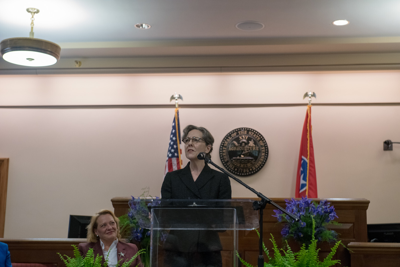A quiet but very important part of the Nashville legal world could be headed for a sea change next year — and if you’re ever involved in a lawsuit, it could affect you too.
Last week, Ellen Hobbs Lyle revealed that she has been planning to retire when her Chancery Court term ends next year. Regarded by many as one of the most capable trial court judges in the state, the embattled chancellor could be forgiven for choosing to exit after some members of the state legislature targeted her this session for the offense of letting people vote absentee during a pandemic. Chancery Court hears some of the more complicated disputes between parties, and often between state and local governments and citizens, businesses and other entities. Lyle is the jurist almost everyone would prefer to draw.
Meanwhile, over in Circuit Court, 82-year-old Hamilton Gayden is quietly winding down after almost a half-century on the bench. Appointed to a General Sessions opening by Winfield Dunn in 1974, Gayden has been one of the longest-serving Circuit Court judges, hearing a wide range of suits, from personal injury cases to all manner of employment and contract disputes.
Even if it were just these two jurists — one of four chancellors and one of five circuit judges who hear this type of litigation — it would be a significant change. But consider this: Circuit Judge Thomas Brothers will be 70 in a few weeks, and Circuit Judge Joe Binkley just turned 77. All indications are that the judges are making plans to run again, but an eight-year term is a long commitment. Binkley would be 86 by the end of his next term. Brothers would be 79. And if for any reason they decided to step down during their term, they would be handing a Democratic seat on the bench to Gov. Bill Lee (or our next governor, likely another Republican) to fill. Both are highly respected judges, but there is already buzz within the Democratic side of the Nashville Bar Association about the problems an appointment would create.
And then there is Judge Kelvin Jones. The only African American on the Circuit Court, Jones defeated Carol Soloman in 2014. His own sworn testimony in his divorce trial last year, however, raised issues of breaking into his wife’s cellphone as well as impersonation. His wife also alleged that Jones made almost $200,000 in small cash deposits into their bank account over the span of a month. The case has been referred to a special prosecutor who could indict Jones, making the politics of a re-election run almost impossible.
Having multiple Circuit Court seats potentially in play raises an interesting question: Who wants to fill them?
Former Mayor David Briley is preparing to run for Gayden’s seat, as is Wendy Longmire, an attorney who has spent much of her career defending insurance companies. (Her treasurer works for Liberty Mutual.)
In a different era — the one that produced Gayden, Brothers and Binkley — a number of kingmakers might have had a say in who was appointed to or decided to run for one of these seats. For years, George Barrett and John Seigenthaler played this role, often together, as well as people like Fate Thomas, David Torrence, Barbara Haynes and Charlie Cardwell. They would vet candidates and often help stitch together a winning political coalition.
But absent any real power brokers or political machines here in town, the path has changed. Because of the timing of the primary in the spring, the race is often a low-turnout affair. In recent years, that has increased the political clout of Black Nashvillians, the most reliable voters in a mostly Democratic city where the party primary usually determines the final outcome.
Because judicial races often have few issues that resonate with voters, they’re also notoriously hard to raise money for, and even less so for the Circuit Court. In criminal court, judges can make nods toward being in favor of either “law and order” or “criminal justice reform” to separate themselves, but on the civil side it’s largely a matter of résumé. That means it will require a lot of self-funding for many candidates in a countywide race that will cost six figures (like Longmire), or someone who already has a lot of name ID (like Briley). So the pool is already limited.
In talking to more than 20 people around the city for this piece, I tried to reach out to a number of attorneys who might be interested. One potential candidate, I thought, might fit the bill: young, but with a diversity of experience on both the criminal and civil side of the bar; political enough; bright; great reputation among her peers. Her response to me? No way. It’s not that she wouldn’t love to be a judge, but the thought of running for office made her shudder.
And for those who are politically inclined, the statewide landscape has changed. For someone like Thomas Brothers, who was appointed by Gov. Ned McWherter in 1989, distinguished tenure in the Circuit Court might have led to a position on the Court of Appeals or higher. But with Democrats effectively shut out of appointments at the state level, these courts have to be viewed as terminal positions. And unlike General Sessions, where the job is comparatively easy, Chancery and Circuit require substantial immersion in the law and the ability to deal with often complex litigation.
So, let’s see. We might need multiple candidates with a range of experience and a good temperament. They need to be smart enough to handle big issues and fair enough to let both parties make their case. They should be well-off, in order to fund at least part of a campaign. And if they want to win, they should probably be a Democrat, but not one who views this as a stepping stone to something else.
If the floodgates open, we’re about to find out just how many of those unicorns exist.





